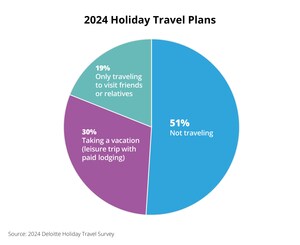NEW YORK, Nov. 13, 2017 /PRNewswire/ -- New research by Deloitte Consulting LLP's Bersin shows that people analytics, the use of employee data to help optimize business and management decisions, is strongly related to improved talent outcomes and an organization's profitability. In fact, high-maturity organizations, or those using people analytics in a sophisticated and insightful way, report 82 percent higher three-year average profit than their low-maturity counterparts.
In its newly-released report, "High-Impact People Analytics: The 2017 Maturity Model," developed after one year of extensive research, Bersin identifies seven leading practices and describes ways that companies can rapidly improve their analytics strategies.
"People analytics has evolved into a powerful and important business discipline," said Josh Bersin, principal, Deloitte Consulting LLP, and founder and editor-in-chief of Bersin, Deloitte's digital destination for the human resources professional. "Organizations that invest in this area are seeing above-average improvements in employee engagement, performance and profitability. Yet despite these clear advantages, only 17 percent of companies have achieved these benefits and some are far behind."
Despite the potential business growth and the value derived from people analytics, only 2 percent of the organizations surveyed have reached the highest level of people analytics maturity. The majority of companies surveyed are still in the midst of building HR data warehouses, enhancing data security and accuracy, collecting data more regularly and consolidating their employee-related data.
The Bersin report offers seven key research findings comparing organizations with high and low maturity analytics programs, and actions organizations can take to help improve their people analytics capabilities. These are:
- The highest performing companies are characterized by an entire culture of data-driven decision-making. From top to bottom, they use data for all selection, promotion, organization and other people-related decisions. If organizations encourage senior leaders to continuously communicate the importance of data, this will likely foster a "data" culture.
- Analytics is nearly impossible without data accuracy, consistent definitions for key metrics, and strong privacy policies. It is critical that organizations invest in infrastructure to help integrate and clean up their employee data.
- The more mature organizations use multiple "listening channels" to gather data from many sources, including HR systems, communications portals, feedback tools and other employee data sources. Organizations should build a listening strategy and think of ways to expand it over time.
- Basic data literacy among HR practitioners is a bottleneck. The most mature companies have above-average skills in elementary statistics and data analysis among HR professionals. It is crucially important for organizations to provide both targeted and continuous learning opportunities for HR employees to develop their analytics skills.
- Successful people analytics teams no longer operate in a silo. Instead, the most effective teams are integrated with other analytics, business, and corporate groups in the company. Organizations should structurally design their people analytics team to foster active collaboration.
- The market has shifted from one of analysis to one of information delivery. Highly-mature companies deliver actionable data-driven information to managers; they do not just perform studies. Building capabilities is important, but "delivering" those capabilities is equally important.
- High performing analytics teams borrow from and work closely with business operations, finance and other functions – they do not focus solely on HR. To be able to succeed, organizations should shift their cultural mindset from "HR measuring HR" to "HR enabling the business to deliver."
In its research, Bersin surveyed more than 900 talent and business leaders in approximately 700 unique organizations, with more than half of those based in North and South America, and employing between 1,000 and 50,000 people. In addition, Bersin conducted approximately 60 in-depth interviews with people analytics professionals and thought leaders worldwide.
Learn more about Deloitte's Bersin research or its membership by visiting the Bersin homepage.
About Deloitte
Deloitte provides industry-leading audit, consulting, tax and advisory services to many of the world's most admired brands, including more than 85 percent of the Fortune 500 and more than 6,000 private and middle market companies. Our people work across more than 20 industry sectors to make an impact that matters — delivering measurable and lasting results that help reinforce public trust in our capital markets, inspire clients to see challenges as opportunities to transform and thrive, and help lead the way toward a stronger economy and a healthy society. Deloitte is proud to be part of the largest global professional services network serving our clients in the markets that are most important to them.
Deloitte refers to one or more of Deloitte Touche Tohmatsu Limited, a UK private company limited by guarantee ("DTTL"), its network of member firms, and their related entities. DTTL and each of its member firms are legally separate and independent entities. DTTL (also referred to as "Deloitte Global") does not provide services to clients. In the United States, Deloitte refers to one or more of the US member firms of DTTL, their related entities that operate using the "Deloitte" name in the United States and their respective affiliates. Certain services may not be available to attest clients under the rules and regulations of public accounting. Please see www.deloitte.com/about to learn more about our global network of member firms.
SOURCE Deloitte
Related Links
WANT YOUR COMPANY'S NEWS FEATURED ON PRNEWSWIRE.COM?
Newsrooms &
Influencers
Digital Media
Outlets
Journalists
Opted In






Share this article